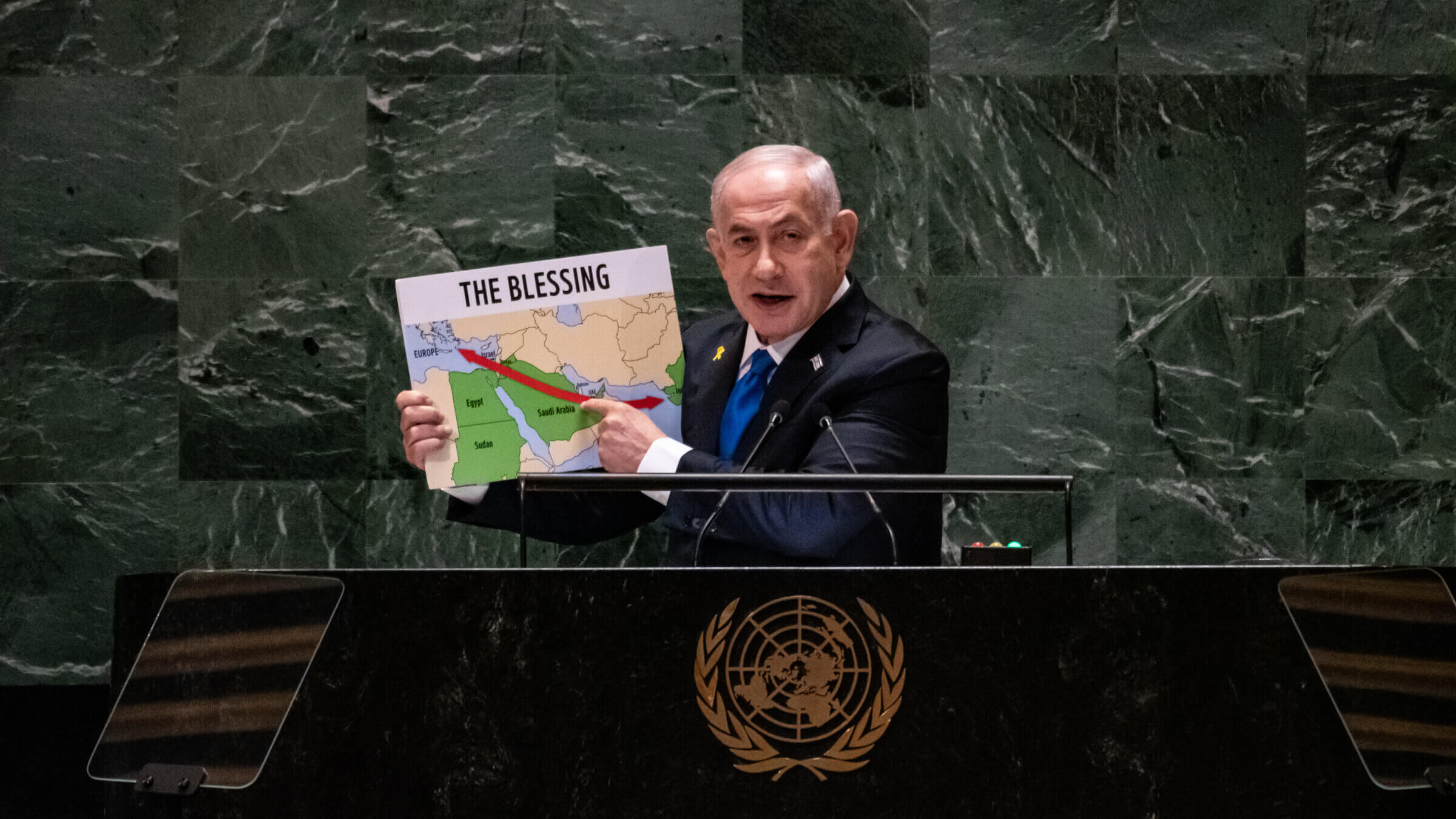Netanyahu, blasting UN as antisemitic, offers vision for peace rooted in Saudi deal
In a speech before the General Assembly, the Israeli prime minister said normalization with Saudi Arabia would be a ‘true pivot of history’

Israeli Prime Minister Benjamin Netanyahu speaks to the United Nations General Assembly Sept. 27, presenting a map to illustrate how alliances could bring about peace in the Middle East. Photo by Stephanie Keith/Getty Images
Israeli Prime Minister Benjamin Netanyahu railed against the United Nations in a speech before the General Assembly Friday, calling it a “swamp of antisemitic bile,” but also painted a peaceful vision for the Middle East grounded in a normalization deal between Israel and Saudi Arabia.
That deal, he said, was “closer than ever” before Hamas’ Oct. 7 attack on Israel scuttled it.
Netanyahu made an impassioned case for its revival in the General Assembly chamber, even as Saudi Arabia’s U.N. delegation, like that of many Arab and Muslim states, boycotted Netanyahu’s approximately 35-minute address.
He delivered it the same day Israel hit a key Hezbollah target in Beirut, further escalating its campaign against the Iran-backed militia. The Biden administration has grown increasingly frustrated with its failure to tamp down tensions it fears will explode into all-out war.
“What blessing such a peace with Saudi Arabia would bring,” Netanyahu said, describing a future shared boon in trade, tourism and technology.
“Such a peace, I am sure, would be a true pivot of history. It would usher in a historic reconciliation between the Arab world and Israel, between Islam and Judaism, between Mecca and Jerusalem.”
Saudi Arabia favors such an agreement, but not without a clear commitment to a two-state solution granting the Palestinians a state, a condition Netanyahu has resisted.
As an extension of the Abraham Accords, which in 2020 normalized relations between Israel and four states — the United Arab Emirates, Bahrain, Sudan, and Morocco — Netanyahu may imagine a Saudi deal as the capstone of his legacy as Israel’s longest-serving prime minister.
But reports also indicate that he is not ready to move forward with an agreement until after the U.S. election. Then he will know whether a deal would be brokered under the presidential administration of Donald Trump, who mediated the 2020 Accords, or Vice President Kamala Harris, who has shown more sympathy than Trump to the Palestinian cause.
Netanyahu attacks UN, Palestinian Authority
Netanyahu, who spent part of his youth in Philadelphia and graduated from MIT, said he did not want to leave Israel in wartime, but felt compelled to come to the U.N. to rebut “lies and slander leveled at my country” from the General Assembly podium at which he spoke.
He was the third speaker on Friday morning. The two prime ministers who spoke before him, Robert Golob of Slovenia and Muhammad Shehbaz Sharif of Pakistan, blamed only Israel for the war. Neither mentioned Hamas, Hezbollah or Iran.
“The singling out of the one and only Jewish state continues to be a moral stain on the United Nations,” he said. “It has made this once-respected institution contemptible in the eyes of decent people everywhere.” He noted that of the there have been more resolutions passed against Israel by the UN General Assembly “than against the entire world combined.”
He slammed Palestinian President Mahmoud Abbas in particular, for trying to expel Israel from the U.N., refusing to condemn Hamas’ Oct. 7 attack and “still paying hundreds of millions to terrorists who murder Israelis.”
“For the Palestinians,” Netanyahu said, “this U.N. house of darkness is home court. They know that in this swamp of antisemitic bile, there is an automatic majority willing to demonize the Jewish state on anything.”
Netanyahu’s speech was unusually blunt, even for a prime minister who has rained fire and brimstone on the body since his first term in office in the late 1990.
As he often does in public addresses, Netanyahu blamed Iran as the root of Israel’s troubles, and asked the General Assembly to stand with Israel in countering it for the sake of their own security as well as Israel’s.
He also said Israel has no interest in resettling Gaza, a plan endorsed by many of his far-right allies. And Netanyahu vowed to continue the fight against Hezbollah, even as he gives mixed signals on whether he will back U.S. efforts to reach a three-week ceasefire deal with the militia. He has vowed to neutralize Hezbollah as a threat, but also expressed gratitude to the U.S. Friday morning for trying to broker a deal.
Netanyahu brought families of the hostages with his delegation to the United Nations and recognized them and their suffering. A number of hostage families protested outside the building, calling on Netanyahu to agree to Biden’s ceasefire-for-hostages deal.
On Thursday, thousands of other protesters, outside the Metropolitan Museum of Art and other landmarks, condemned Netanyahu and Israel for airstrikes in Gaza and Lebanon.
Netanyahu speculated that the protesters were backed by Iran.
“Iran’s funds and fuels many of the protesters against Israel,” he said. “Maybe some of the protesters, or even many of the protesters, outside this building now.”
JTA contributed to this report.















